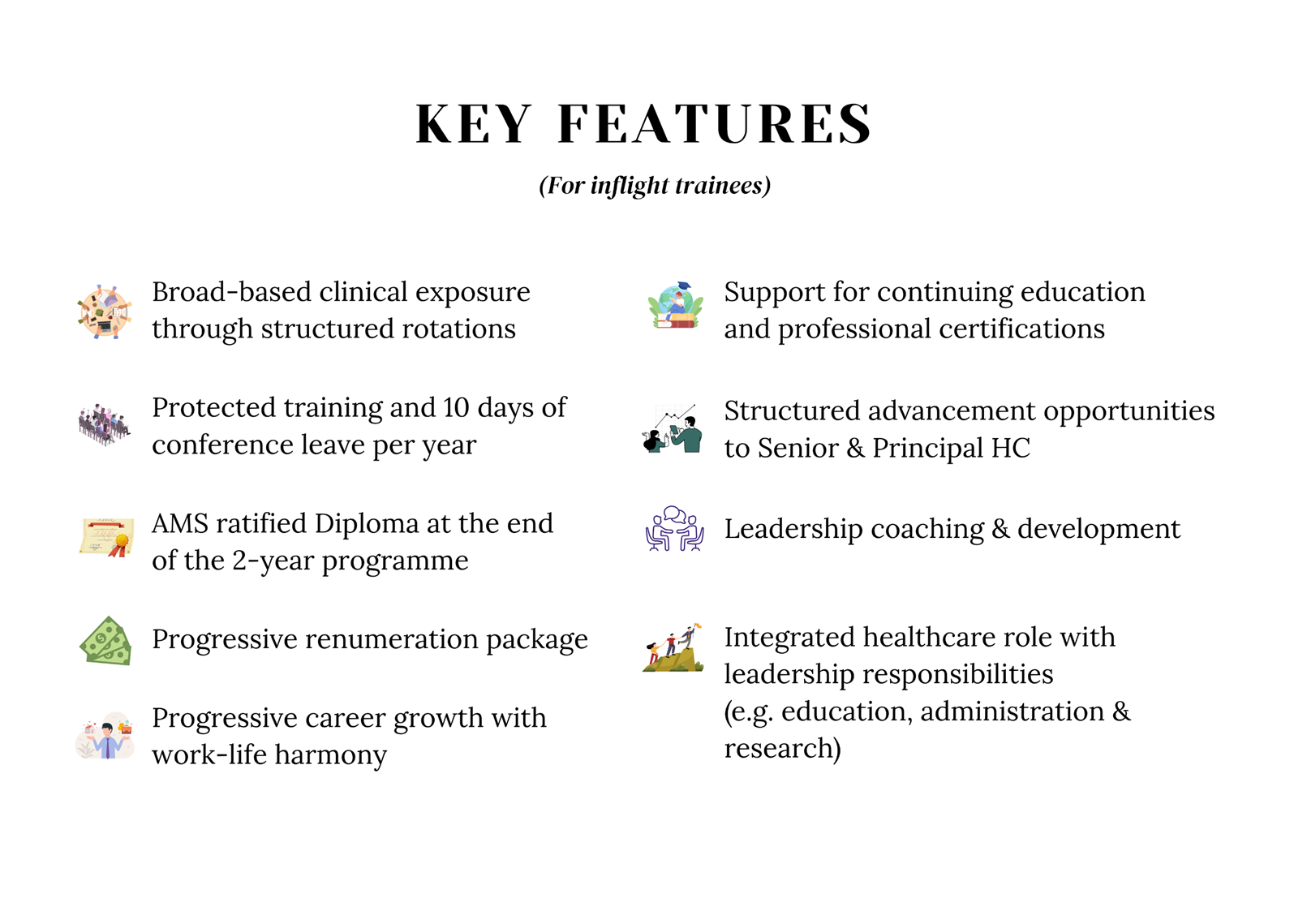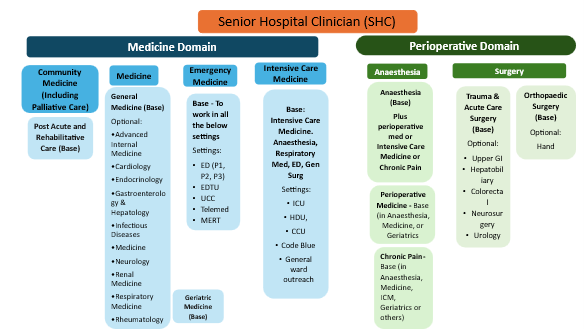The Hospital Clinician (HC) Scheme is a career pathway for doctors in public hospitals, providing clinical experience and broad medical skills. HCs are essential in inpatient care alongside specialists, nurses, and allied health professionals. The Scheme features a two-year training program, culminating in the Graduate Diploma in Hospital Practice (GDHP) exam by the Academy of Medicine, Singapore. Senior/principal resident physicians or ex-residents may join an accelerated path to earn the GDHP qualification.
Why choose the Hospital Clinician track?
- The HC scheme is nationally recognised for doctors dedicated to public service.
- Provides a progressive pay package to work in various medical and surgical settings.
-
Service grades include:
-
Hospital clinician (HC)
- Senior hospital clinician (SHC)
- Principal hospital clinician (PHC)
|
Quotes from our NHG Hospital Clinicians
"The programme allows me to rotate through relevant departments that help me build the clinical skills needed for my future career. It also offers a lot more flexibility in choosing my postings. In addition to the compulsory six-month training in general medicine, I can choose other postings that I feel are lacking in my experience or will benefit my career path. These shorter postings, and the flexibility in scheduling them, allow me to balance my family commitments and spend more quality time with my loved ones."
- Dr Yu ZiJun “Joined the HC community around 2 years now. No regrets and it's a fun process. Learned a lot as well during the various postings."
- Dr Low Jia Ming “I joined HCS to broaden my skills, beyond the acute care setting, in working with diverse patient populations. My experience thus far has been rewarding and enriching with the camaraderie forged with my fellow HC colleagues and my non-HC colleagues throughout the rotations."
- Dr Yu Long Hei
|
Key Features of the Scheme

|
Eligibility Criteria
- Singaporean, Permanent Resident, or local-trained foreigner1.
- At least two years of full-time work experience as a medical officer in Singapore (earliest entry level: PGY4).Or Foreign-trained medical officers in MOPEX with at least five years of practice in Singapore.
- Letter of recommendation from a supervisor or senior clinician on suitability for the scheme.
- ·Full or conditional2 registration with the Singapore Medical Council.
1 Local-trained foreigners are those who graduated from a local medical school or completed local residency training.
2 Conditionally registered doctors must reach L2 supervisory level before transferring employment to NHG institutions. Intake- HC has two annual intakes: January and July.
- Aligns with the start of MOPEX cycles.
- Applications open at the end of September for January intake.
- Applications open in March for July intake.
Employment- Medical Officers (MOs) in the HC scheme remain employed by MOHH as MO (HC) until eligible for transfer or employment to respective institutions.
- They will maintain MOHH terms of employment, including remuneration.
- The earliest transfer from MOHH to institutions is at Post-Graduate Year 5 (PGY5).
- The timing of employment transfer is independent of the entry point into the HCS.
|
Transitions
Doctors with previous residency experience for the HC scheme
- MOH recognises relevant residency postings as part of HC rotations.
- Reduces HC phase duration if doctors:
- Joined HC scheme within 12 months from last residency date.
- Not away from clinical practice for over six months in the past year before joining the scheme.
Resident Physicians (RPs) or equivalent for the HC scheme
- RPs should apply to the HC scheme through the usual recruitment and intake process as that of MOs.
- Foreign-trained medical officers in MOPEX can join HCS if they have at least five years of practice in Singapore.
Senior RPs (SRPs) or equivalent for the HC scheme
- SRPs or SPR-equivalents can transition to the HC scheme if they meet the following requirements:
- Be a Singaporean, Singapore Permanent Resident, or locally trained foreigner.
- Have at least two years of full-time work experience as an MO or equivalent in Singapore.
- Foreign-trained foreigner (FTF) MOs in MOPEX must have at least five years of practice in Singapore as MOs or equivalent.
- Must be at least PGY6.
- Worked for a minimum of 12 months as an SRP or SRP-equivalent in any department prior to joining the HC scheme.
- Not away from clinical practice for more than six months during the 12-month period.
- Obtain a letter of recommendation from a supervisor or senior clinician on their suitability to join the scheme.
For progression to Senior HC, the following criteria must be met:
- Achieve the required supervision levels for the HC Entrustable Professional Activities (EPAs).
- Pass the exit examination administered by the Academy of Medicine, Singapore (AMS) and be conferred the Graduate Diploma in Hospital Practice (GDHP).
Principal RPs (SRPs) or equivalent for the HC scheme
The criteria for progression from Senior HC to Principal HC are as follows:
- PGY12 minimum requirement for progression to Principal HC.
- At least six years' experience in an SPR or SRP-equivalent position.
- Must undertake non-clinical leadership responsibilities in administration, research, or education with endorsement by senior management for additional recognition and remuneration.
|
Roles and Responsibilities of Hospital Clinicians
HCs provide critical medical care in acute to subacute hospital settings, supporting specialists with their broad medical skills. Their expected competencies include:
- Advanced triage to identify complex conditions needing specialist consultation
- Broad-based diagnoses and holistic management of acute presentations
- Inter-disciplinary coordination of care among various specialties
- Comprehensive transition of care beyond the subacute setting, including discharge planning and advanced care planning
- Pre-operative risk evaluation and optimisation
- Post-operative care involving management of drains, ventilation, nutrition, rehabilitation, and recognition of complications requiring specialist intervention
HCs undertake wider tasks compared to RPs, whose roles address service gaps.
HCs undergo structured assessments to ensure competency for defined roles.
Roles and Responsibilities of of Senior Hospital Clinicians
Senior HCs are expected to perform similar roles as HCs independently, with additional responsibilities:
- Anchor team during inpatient ward rounds, complementing specialist oversight
- Manage acute inpatients up to 24 hours, including after office hours with specialist coverage
- Lead resuscitation and stabilisation of critically ill patients, supervised by specialists if needed
- Handle complex communication in non-specialist areas, such as advance care planning and psychosocial issues
- Perform common bedside procedures like lumbar puncture and chest tube insertion, with specialist guidance when necessary.
SHCs will be assigned to either 'Medical – Acute and Subacute Care' or 'Peri-operatives – Surgical and Anaesthesia', both maintaining strong medical skills for cross-deployment (Table 1).

Table 1: Deployment of SHCs to medical and perioperative domains
|
Career Progression
A career as a Hospital Clinician (HC) is not only rewarding but also filled with exciting growth opportunities. Starting as a HC, you'll gain invaluable experience in public healthcare. As you progress, you can aspire to become a Principal Hospital Clinician (PHC), which is the pinnacle of the HC scheme. Reaching the PHC grade opens doors to leading roles in administration, education, or research at institutional or cluster levels. Endorsed by senior management, these positions come with recognition and remuneration that reflect your contributions and expertise. Embark on this dynamic journey where each step brings new challenges and achievements, ensuring a fulfilling and impactful career path.
Back to Top
|